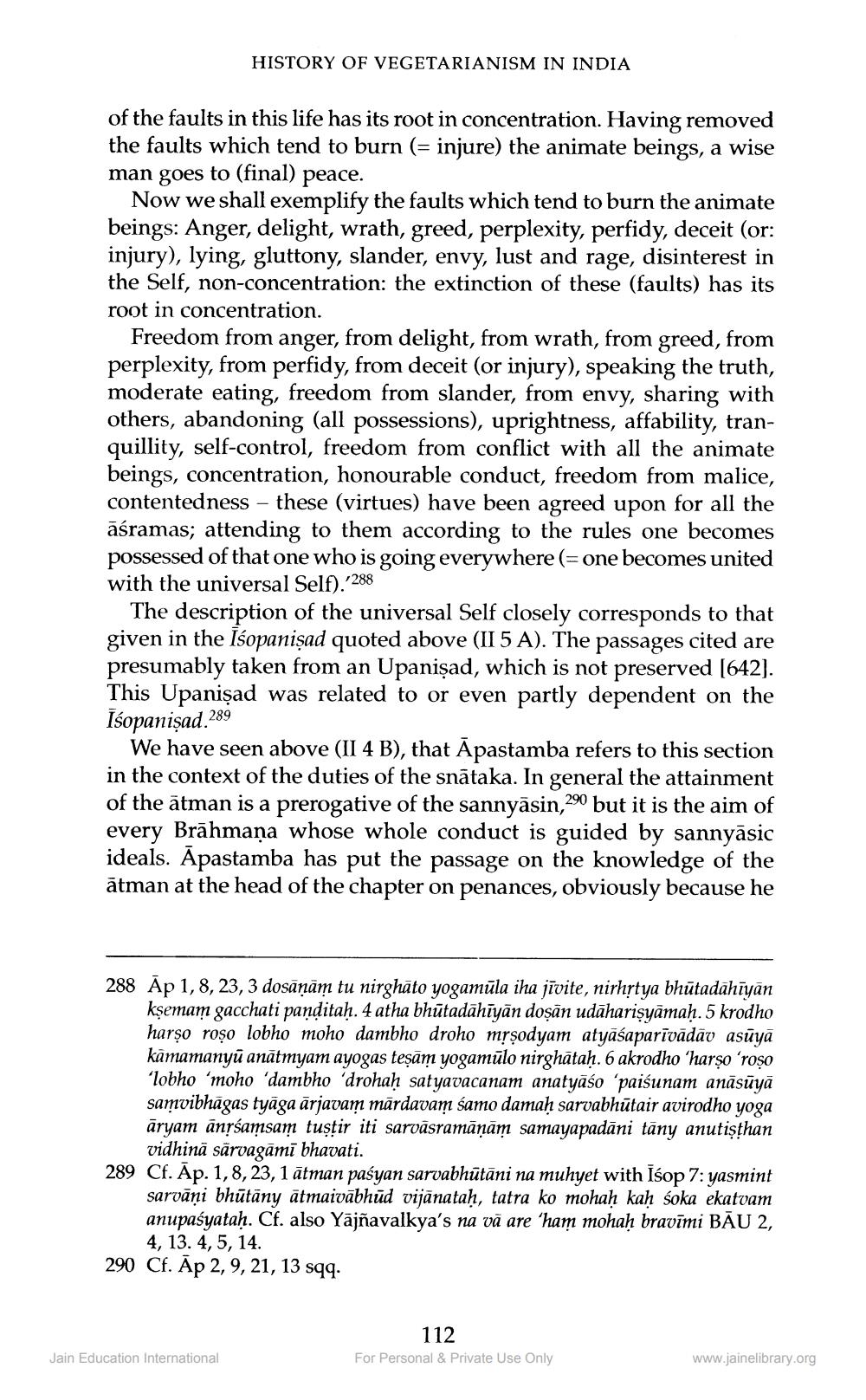________________
HISTORY OF VEGETARIANISM IN INDIA
of the faults in this life has its root in concentration. Having removed the faults which tend to burn (= injure) the animate beings, a wise man goes to (final) peace.
Now we shall exemplify the faults which tend to burn the animate beings: Anger, delight, wrath, greed, perplexity, perfidy, deceit (or: injury), lying, gluttony, slander, envy, lust and rage, disinterest in the Self, non-concentration: the extinction of these (faults) has its root in concentration.
Freedom from anger, from delight, from wrath, from greed, from perplexity, from perfidy, from deceit (or injury), speaking the truth, moderate eating, freedom from slander, from envy, sharing with others, abandoning (all possessions), uprightness, affability, tranquillity, self-control, freedom from conflict with all the animate beings, concentration, honourable conduct, freedom from malice, contentedness - these (virtues) have been agreed upon for all the āśramas; attending to them according to the rules one becomes possessed of that one who is going everywhere (=one becomes united with the universal Self). 288
The description of the universal Self closely corresponds to that given in the Isopanişad quoted above (II 5 A). The passages cited are presumably taken from an Upanişad, which is not preserved (642). This Upanişad was related to or even partly dependent on the Īśopanisad.289
We have seen above (II 4 B), that Āpastamba refers to this section in the context of the duties of the snātaka. In general the attainment of the ātman is a prerogative of the sannyāsin,290 but it is the aim of every Brāhmaṇa whose whole conduct is guided by sannyāsic ideals. Āpastamba has put the passage on the knowledge of the ātman at the head of the chapter on penances, obviously because he
288 Ap 1,8, 23, 3 dosāņām tu nirghāto yogamūla iha jīvite, nirhrtya bhūtadāhīyān
kşemam gacchati panditaḥ. 4 atha bhūtadāhīyān doşan udāharişyāmaḥ. 5 krodho harso roso lobho moho dambho droho mặşodyam atyāśaparīvādāv asīyā kāmamanyū anātmyam ayogas teşam yogamūlo nirghātaḥ. 6 akrodho 'harşo‘roso ‘lobho 'moho 'dambho 'drohaḥ satyavacanam anatyāso 'paiśunam anāsūyā samvibhāgas tyāga ārjavam mārdavam samo damaḥ sarvabhūtair avirodho yoga āryam änțsamsam tuştir iti sarvāsramāņām samayapadāni täny anutişthan
vidhinä särvagāmi bhavati. 289 Cf. Ap. 1,8, 23, 1 ātman paśyan sarvabhūtāni na muhyet with Isop 7: yasmint
sarvāni bhūtäny ätmaivābhūd vijānatah, tatra ko mohah kah soka ekatvam anupaśyataḥ. Cf. also Yājñavalkya's na vā are 'ham mohaḥ bravīmi BĀU 2,
4, 13. 4,5, 14. 290 Cf. Āp 2, 9, 21, 13 sqq.
112 For Personal & Private Use Only
Jain Education International
www.jainelibrary.org




